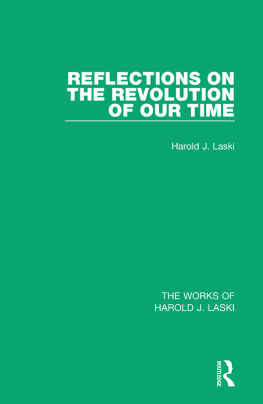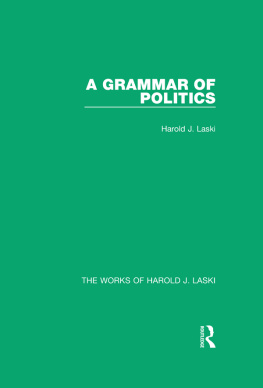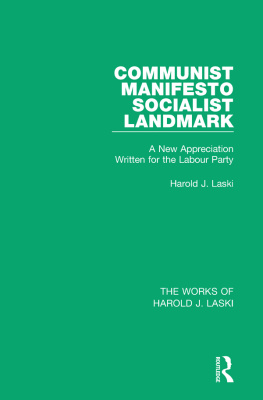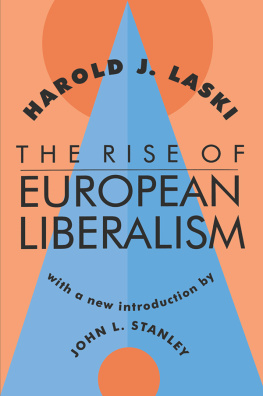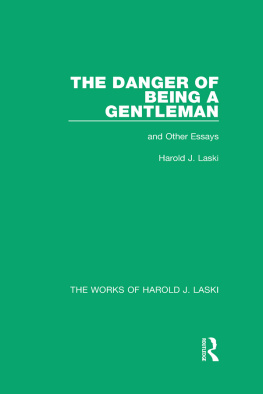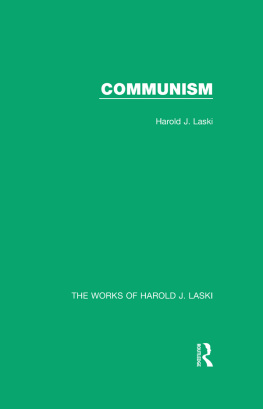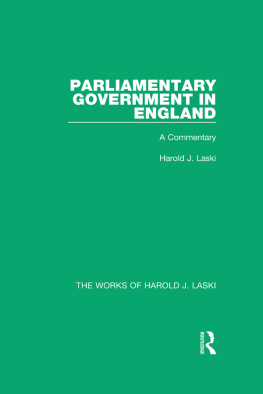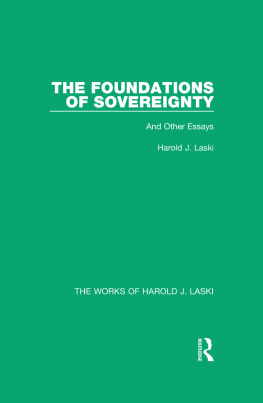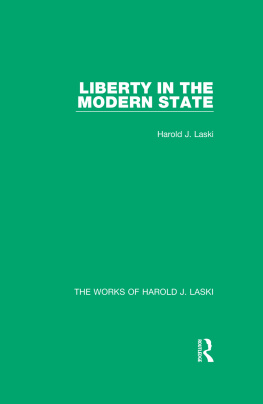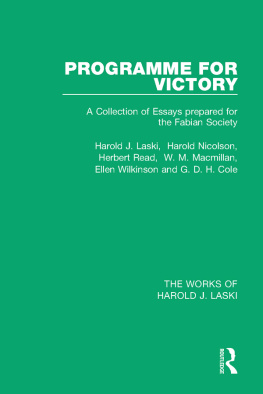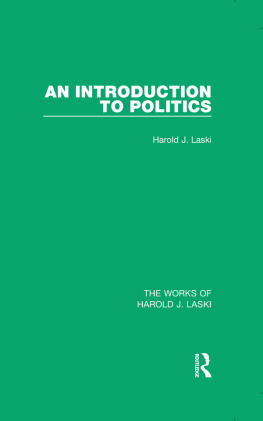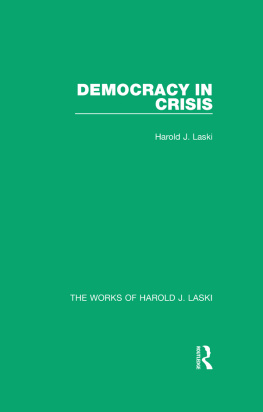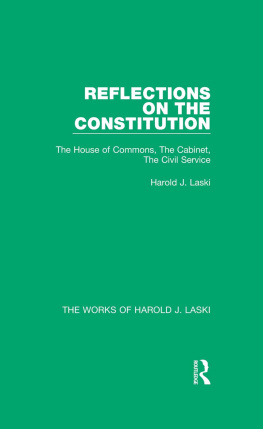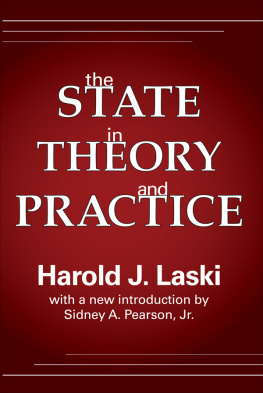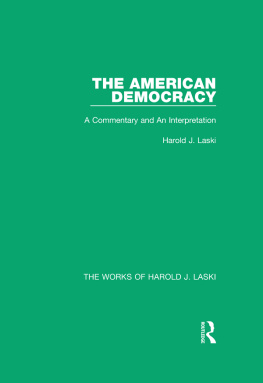THE WORKS OF HAROLD J. LASKI
Volume 16
REFLECTIONS ON THE REVOLUTION
OF OUR TIME
First published in 1943
This edition first published in 2015
by Routledge
2 Park Square, Milton Park, Abingdon, Oxon, OX14 4RN
and by Routledge
711 Third Avenue, New York, NY 10017
Routledge is an imprint of the Taylor & Francis Group, an informa business
1943 George Allen & Unwin Ltd
All rights reserved. No part of this book may be reprinted or reproduced or utilised in any form or by any electronic, mechanical, or other means, now known or hereafter invented, including photocopying and recording, or in any information storage or retrieval system, without permission in writing from the publishers.
Trademark notice: Product or corporate names may be trademarks or registered trademarks, and are used only for identification and explanation without intent to infringe.
British Library Cataloguing in Publication Data
A catalogue record for this book is available from the British Library
ISBN: 978-1-138-81912-2 (Set)
eISBN: 978-1-315-74273-1 (Set)
ISBN: 978-1-138-82227-6 (Volume 16)
eISBN: 978-1-315-74254-0 (Volume 16)
Publishers Note
The publisher has gone to great lengths to ensure the quality of this reprint but points out that some imperfections in the original copies may be apparent.
Disclaimer
The publisher has made every effort to trace copyright holders and would welcome correspondence from those they have been unable to trace.
FIRST PUBLISHED IN 1943
SECOND IMPRESSION 1944
THIRD IMPRESSION 1944
FOURTH IMPRESSION 1946
THIS BOOK IS PRODUCED IN
COMPLETE CONFORMITY WITH THE
AUTHORIZED ECONOMY STANDARDS
ALL RIGHTS RESERVED
PRINTED IN GREAT BRITAIN
in II-Point Baskerville Type
BY UNWIN BROTHERS LIMITED
WOKING
TO MY FRIENDS
E. R. MURROW AND LANHAM TITCHENER
WITH AFFECTION
CONTENTS
PREFACE
THIS book owes an immense debt to my friends, especially to those endless debates at 17 Clarkson Road where my fellow evacuees and I have discussed its problems term after term, since war began, until, with the midnight news, we turned from analysis of principle to speculation upon the event. It owes much, too, to my students who, in the seminars at the London School of Economics and Political Science, have insisted on trying to understand both what they are fighting for and how they can free future generations of students from the curse of war. Much of it has been shaped by the questions and criticisms put to me at Labour Party conferences all over the country, and in those lectures in camp and aerodrome where the determined heckling of soldiers and airmen has taught me how Cromwells Ironsides became that unbeatable instrument, a thinking army. I add that no small part of its doctrine is the outcome of the pride every citizen of this country is bound to have in the amazing heroism and endurance in the common people he has witnessed day by day during the blitz, and by the majestic spectacle of Russian resistance in the face of a threat which seemed almost to have civilization by the throat. I have, too, been naturally influenced by watching the skill with which President Roosevelt taught the American people the lesson that they can only belong to themselves as they give their service to freedom, and I hope I have not missed the significance of the opposition he so superbly fought until Japan, at Pearl Harbour, made the nature of the issue unmistakable.
I cannot but place on record how much I have learned from the writings of Professor E. H. Carr, especially from his Conditions of Peace, from those of Professor Max Lerner, Leonard Woolf and Kingsley Martin; and from talk with my friends Louis Lvy, Andr Labarthe, and Flix Gouin, I have learned not a little of the causes which led to the betrayal of France and of the spirit by which she will renovate that civilized tradition her people have so largely helped to shape.
I finished this book, begun in the second month of the war, just as Parliament began to discuss the issues of reconstruction, and Sir William Beveridges Report on the Social Services provided at least one fundamental test by which we can judge how far the British government is really prepared to make the Four Freedoms part of the heritage of the next generation. To what is written in the pages that follow I need only add that the whole burden of Sir Williams remarkable analysis seems to me to reinforce the conclusion there reached, that it is in the months between now and our victory that we have to take those vital decisions upon which depends our power to use it for great purposes. If we wait beyond the victory before we make our choice, we shall throw away one of the supreme opportunities of history.
I have dedicated this book to two friends with whom I have shared many hours of both grief and happiness in these years. Mr. Titchener, I know, will not mind my saying with special emphasis that our country owes an immense debt to Mr. E. R. Murrow. Day and night since before the war began he has done everything that courage and integrity can do to make events in this country a living reality to his fellow citizens of the United States. I am only one of the many Englishmen who have found in his faith and trust in our people a new power to endure and hope.
Lastly, as always, I could not have written this book had not all that has gone to its making been shared with my wife. I say no more than this because she would not permit me to say more. But at least I can put on record my knowledge that danger shared is affection deepened.
HAROLD J. LASKI
MANOR COTTAGE
LITTLE BARDFIELD, ESSEX
November 27, 1942
I
WE are in the midst of a period of revolutionary change that is likely to be as profound as any in the modern history of the human race. We shall not understand its inner nature unless we recognize it to be as significant in its essentials as that which saw the fall of the Roman empire, the birth, with the Reformation, of capitalist society, or, as in 1789, the final chapter in the dramatic rise of the middle class to power.
It is not a revolution made by thinkers, though some of them have foreseen its coming, and even shaped the large outlines of its direction. It is not a revolution, either, which any group of statesmen has deliberately brought about, even though some of them, consciously or unconsciously, have hastened its advent and increased its momentum. Its nature lies, as its inevitability will be found, in all that goes to give its present character to our society. We can, of course, recognize its advent and prepare for it; in that event, we might build a civilization richer and more secure than any of which we so far have knowledge. Or we may choose to resist its onset; in which case, it will appear to some future generation that our age has sought rather to sweep back the tides of the ocean than to oppose the decrees of men.
As always in a period of revolution, the drive to fundamental change is accompanied by disintegration and conflict; and, as always also, these are attributed to the wanton choice of evil men instead of to those deeper and impersonal causes which they are powerless to control and of which they are no more than transient symbols. As always, also, we seek less to discover those impersonal causes than to find some easy and partial remedy which will effect, at least for our own time, a passing obscuration of the obvious and more painful symptoms of the disease.

